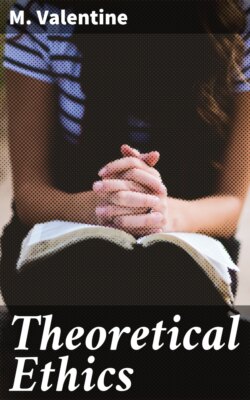Читать книгу Theoretical Ethics - M. Valentine - Страница 3
На сайте Литреса книга снята с продажи.
ОглавлениеPREFACE.
Table of Contents
Ethical Theory has felt the full force of recent scientific and philosophical agitation. The earlier systems have been subject to earnest and continued discussion. The severest tests available by the progress of knowledge have been applied to both their premises and their conclusions. New theories, based on changed conceptions of man and the world, have been variously elaborated, presenting greatly altered views of the whole phenomenon of morality. While not overthrowing old views these have given instructive suggestions. The ethical field has thus been largely re-surveyed, and whatever light modern science and speculation have furnished has been thrown upon this great and unceasingly important subject. In some respects the agitation has brought confusion and uncertainty. The clash of theories has been disturbing. But on the whole ethical philosophy has been the gainer. The discussions have certified the immovable foundations and essential features of the moral system. The fresh light from the advance of knowledge has proved, as it always does, not destructive, but corrective and confirmatory. The abiding truth has been shown and vindicated by the ordeal through which it has passed.
This volume is largely the outcome of the author's many years of class-room lecturing on the subject. Its object is to furnish for students and general readers a compendious view of the ethical facts and principles as the author believes them to be established by the best accredited knowledge and thought of our times. There seems to be room for such a work. The method is believed to give proper recognition to both the empirical and metaphysical sides of the subject. Starting from the universal phenomenon of moral distinctions in life, it determines the conscience psychologically, as a rationally intuitive power discerning the moral distinction and the reality and authority of moral law. The implications of conscience and moral law necessarily become theistic. The metaphysical examination finds for the real phenomena of the subjective faculty the objective and abiding reality of the ethical law which the faculty discerns, and the right or morally good itself so perceived as consisting proximately in a conformity of conduct with the relations of life in which moral requirement meets human freedom, and as ultimately grounded in the absolute and perfect source of the moral constitution of the universe. The movement carries to the conclusion of eternal and immutable moral law. The disclosures of revelation confirm the ethical law of the natural reason, completing the moral view and supplying, in the divine forces of Christianity, the proper dynamic for the realization of the ethical life.
The volume is humbly sent forth in the hope that it may contribute somewhat to the cause of truth and prove quickening to the life of duty and righteousness.
Gettysburg, Dec. 1, 1896.
THEORETICAL ETHICS.
Table of Contents
CHAPTER I.
DEFINITION AND DIVISIONS.
Table of Contents
Ethics Defined.
1. Ethics is the science of rectitude and duty. It treats of the right and its obligations. Its subject is morality. Its sphere is the sphere of virtuous conduct. It covers a double range of inquiry, as the subject-matter lies within or without the human constitution. On the one side it investigates and sets forth the facts and laws of man's moral constitution; on the other, the nature and grounds of the distinction of right and wrong. In the light of the whole investigation into these fundamental verities, it determines the principles and rules of duty in the various relations of life. It thus discovers and elucidates the underlying pre-suppositions and principles upon which the phenomena of moral discernment and obligation rest, and on which man rises into the possibility and reality of character, as his supreme distinction among the orders of existence on earth. The inquiry throughout is conducted according to the scientific method of careful observation and analysis of the unquestionable facts concerned, and an orderly presentation of their necessary logical implications and conclusions. Hence the product of the investigation, as the systematized view of the facts, with their underlying principles, may justly be called, as it usually is called, moral science.
The term Ethics, which we thus use to designate this branch of study, with its systematized truth, is not employed with etymological strictness. For it comes from the Greek ἦθος [Greek: êthos], moral character, which, according to Aristotle is derived from ἔθος [Greek: ethos] custom, under the notion that moral virtue is a product of repeated acts of voluntary preference.1 Taken strictly this would build rectitude or the ethically right on the mere habits or usages of a people. But this conception of the basis of virtue must not be included and carried into the scientific use of the word, or be at all allowed to prejudice the final decision of this great question of the foundation of right, in the end, in the light of all the facts in the case.2
The Latin equivalent for ἦθος [Greek: êthos] was mos, with similar suggestion as to the nature of rectitude, and human duty was treated under the head of De Moribus. Cicero says: "Quia pertinet ad mores, quod ἦθος [Greek: êthos] illi vocant, nos eam partem philosophiæ De Moribus appellare solemus; sed decet augentem linguam Latinam nominare Moralem."3 This suggestion of Cicero has given the common English designation Morals or Moral Philosophy. Recent usage, however, speaks of the study rather as moral science, in harmony with the prevailing preference for the term science in all investigations conducted under the inductive method. It is, nevertheless, as will appear, largely a metaphysical and philosophical investigation, and, if classed as science, must be counted as pre-eminently a philosophical science.
